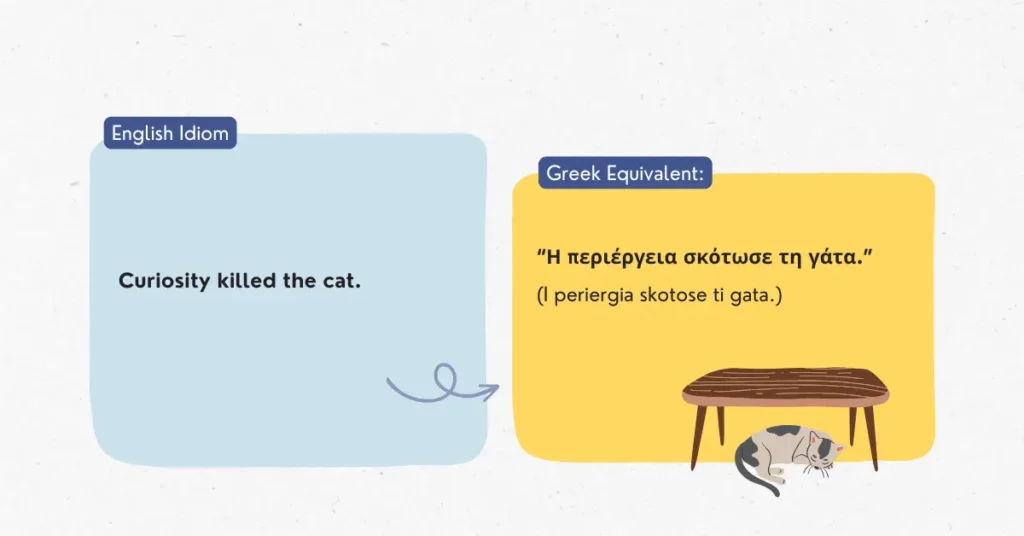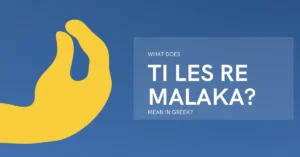Exploring the Colorful World of Expressions Across Cultures. Idioms are like the spice of language, as they add flavor, color, and personality to everyday speech. Every culture has its own quirky, poetic, or downright funny ways of expressing things, and English and Greek are no exception. What’s fascinating is how different languages capture the same ideas with totally different imagery or, sometimes, almost the exact same metaphor.
Here is the list of some popular English idioms and their Greek equivalents. You’ll see how language reflects not just meaning but culture and worldview.
- English Idioms and Their Greek Equivalents
- 1. It’s all Greek to me.
- 2. Don’t cry over spilled milk.
- 3. The pot calling the kettle black.
- 4. When pigs fly.
- 5. Hit the nail on the head.
- 6. Let the cat out of the bag.
- 7. To kill two birds with one stone.
- 8. Dropping like flies.
- 9. Curiosity killed the cat.
- 10. Like a fish out of water.
- 11. Knock on wood.
- 12. Pardon my French.
- 13. A necessary evil.
- 14. That’s a different kettle of fish.
- 15. Donkey’s years.
- 16. Bob’s your uncle.
English Idioms and Their Greek Equivalents

1. It’s all Greek to me.
🗣 Used to say something is completely unintelligible.
Greek Equivalent:
🔁 “Μου φαίνονται κινέζικα.”
(Mou fainontai kinezika.)
➡️ “It looks like Chinese to me.”
Interesting twist: While English blames Greek for incomprehensible things, Greek passes the blame to Chinese!
2. Don’t cry over spilled milk.
🗣 Don’t waste time being upset about things that can’t be changed.
Greek Equivalent:
🔁 “Μην κλαις πάνω από το χυμένο γάλα.”
(Min kleis pano apo to chymeno gala.)
Surprise! This one’s almost identical. Seems like spoiled dairy is universally relatable.
3. The pot calling the kettle black.
🗣 Accusing someone of something you’re guilty of too.
Greek Equivalent:
🔁 “Είπε ο γάιδαρος τον πετεινό κεφάλα.”
(Eipe o gaidaros ton peteino kefala.)
➡️ “The donkey called the rooster big-headed.”
Cultural flavor: Different animals, same irony.
4. When pigs fly.
🗣 Used to describe something that will never happen.
Greek Equivalent:
🔁 “Του αγίου Ποτέ.”
(Tou agiou Pote.)
➡️ “On Saint Never’s Day.”
Meaning: It’ll never happen—not today, not tomorrow, not ever. No flying pigs required.
5. Hit the nail on the head.
🗣 To be exactly right about something.
Greek Equivalent:
🔁 “Βρήκες το καρφί στο κεφάλι.”
(Vrikες to karfi sto kefali.)
➡️ “You found the nail on the head.”
Almost a twin idiom—this one matches nearly word for word.
6. Let the cat out of the bag.
🗣 To reveal a secret.
Greek Equivalent:
🔁 “Αποκάλυψε τα χαρτιά του.”
(Apokalypse ta chartia tou.)
➡️ “He revealed his cards.”
Poker vs. Pets: English goes with a surprise feline; Greek opts for a card game metaphor.
7. To kill two birds with one stone.
🗣 Achieve two things with a single action.
Greek Equivalent:
🔁 “Με ένα σμπάρο, δυο τρυγόνια.”
(Me ena sbaro, dyo trygonia.)
➡️ “With one shot, two turtle doves.”
A poetic upgrade: Turtle doves sound a lot more romantic than birds in general, right
8. Dropping like flies.
🗣 Used when people (or things) are failing, leaving, or collapsing in large numbers—often due to illness, exhaustion, or other disasters.
Greek Equivalent:
🔁 “Πέφτουν σαν τα κοτόπουλα.”
(Péftoun san ta kotópoula.)
➡️ “They’re falling like chickens.”
Fun fact: In Greek, it’s chickens—not flies—that dramatically collapse en masse. The imagery still works: whether it’s flies or chickens, it paints a vivid picture of chaos and rapid downfall.
9. Curiosity killed the cat.
🗣 Being too curious can lead to trouble.
Greek Equivalent:
🔁 “Η περιέργεια σκότωσε τη γάτα.”
(I periergia skotose ti gata.)
Identical match: Turns out cats face the same fate in Greek. Curiosity truly has nine dangerous lives.
10. Like a fish out of water.
🗣 Feeling completely out of place or uncomfortable.
Greek Equivalent:
🔁 “Σαν το ψάρι έξω από το νερό.”
(San to psari exo apo to nero.)
No translation needed: Greek uses the same phrase—proving that even fish get awkward across cultures.
11. Knock on wood.
🗣 Said to avoid bad luck after mentioning something positive.
Greek Equivalent:
🔁 “Χτύπα ξύλο.”
(Chtypa xýlo.)
➡️ “Knock wood.”
Identical superstition: Both cultures trust wood to ward off misfortune. Knock away.
12. Pardon my French.
🗣 Said before or after using rude language.
Greek Equivalent:
🔁 No exact match, but Greeks might say:
“Συγγνώμη για την έκφραση.”
(Signómi gia tin ékfrasi.)
➡️ “Sorry for the expression.”
Cultural difference: English blames the French, while Greek just politely apologizes.
13. A necessary evil.
🗣 Something unpleasant but unavoidable or needed.
Greek Equivalent:
🔁 “Αναγκαίο κακό.”
(Anangkaío kakó.)
Straight match: Evil, but essential—in both languages.
14. That’s a different kettle of fish.
🗣 That’s a completely different situation or issue.
Greek Equivalent:
🔁 “Άλλο καπέλο αυτό.”
(Állo kapélo aftó.)
➡️ “That’s a different hat.”
Same idea, different headgear: Whether it’s hats or kettles, it’s clearly not the same thing.
15. Donkey’s years.
🗣 A very long time.
Greek Equivalent:
🔁 “Χρόνια και ζαμάνια.”
(Chronia kai zamania.)
➡️ “Years and ages.”
Bonus imagery: The Greek version adds an extra poetic touch to how long it’s been.
16. Bob’s your uncle.
🗣 And there you go—it’s done! Easy!
Greek Equivalent:
🔁 No direct equivalent, but similar in meaning:
“Έτοιμο!” or “Κι έγινε!”
(Étoimo! / Ki égine!)
➡️ “Done!” / “And it’s done!”
No uncle needed: While Greeks don’t bring Bob into it, they still love a quick, clean finish.
Which idiom surprised you the most? Do you know any others in Greek or another language? Drop them in the comments!
You might love …




